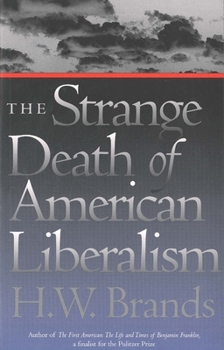The Strange Death of American Liberalism
Select Format
Select Condition 
Book Overview
In this provocative book, H. W. Brands confronts the vital question of why an ever-increasing number of Americans do not trust the federal government to improve their lives and to heal major social ills. How is it that government has come to be seen as the source of many of our problems, rather than the potential means of their solution? How has the word liberal become a term of abuse in American political discourse? From the Revolution on, argues...
Format:Paperback
Language:English
ISBN:0300098243
ISBN13:9780300098242
Release Date:September 2003
Publisher:Yale University Press
Length:218 Pages
Weight:0.65 lbs.
Dimensions:0.6" x 5.5" x 8.2"
Customer Reviews
2 ratings
An Interesting if Sketchy Argument
Published by Thriftbooks.com User , 21 years ago
H.W. Brands has developed an interesting thesis in his recent book "The Strange Death of American Liberalism" that neither liberals nor conservatives will much like. Liberalism, Brands argues, is a centralized political arrangement that can only thrive in the U.S. during wartime. Because of the depth of Americans' distrust of the central government, the natural political fallback position of Americans is conservatism. Only during war do Americans drop this instinctual distrust of the federal government and allow it to take over new responsibilities. So why do some Baby Boomers think that liberalism is a natural and permanent condition in U.S. politics, simply in need of resuscitation? Brands says the duration of the Cold War fooled them. Whereas wars involving the U.S. had been relatively short in the past, the length of the Cold War allowed for a more sustained intrusion of the central government into Americans' lives than ever before.As Brands' book is only 170 pages long, he merely breezes through U.S. history (surprising for a historian), but nevertheless gives an interesting historical sketch as a preliminary test of his hypothesis. He argues, for example, that the basic nature of both progressivism in the early 20th century and the New Deal in the 1930s were both fairly conservative. On the other hand, he also buttresses his thesis by showing the solid advances in power made by the federal government during WW1 and WW2. One of the more surprising bits of data that Brands gives is a poll in 1939 that asked Americans whether the U.S. federal government was spending too much money, not enough, or just the right amount. 61% answered that the government was spending too much. Only 10% said too little. And throughout the 30s, even with unemployment rates never dipping below 10%, and once going as high as 25%, most Americans thought it should be a priority for the government to balance its budget and reduce its debt. On the eve of FDR's second administration, 50% of Democrats and 80% of Republicans said they hoped it would be more conservative than his first administration.Conservatives are probably gleeful to read this. Is there any more palatable thesis to conservatives than that their political philosophy is the natural state for Americans? But while Brands' interpretation of U.S. history is likely to provide some succor for conservatives, his reading of the importance of Reagan will probably turn their stomachs. Reagan, according to Brands, could not overcome the public's distrust of the federal government to enlist its support for new foreign adventures beyond Grenada, or for a more general support of the Cold War beyond increased defence spending.It's here that Brands' argument becomes strained. Aren't huge increases in defence spending still a sign of American trust in the central government in at least one regard? Brands' book is so short that he never gets around to properly answering these kinds of questions. He says t
Is the Return of Big Government Hegemony Around the Corner?
Published by Thriftbooks.com User , 22 years ago
"The Vietnam War and Watergate combined to undermine the American public's confidence in government?" How many times have you heard a variation on this theme to explain the long, precipitous decline of activist government? H.W. Brands posits a novel and provocative twist on this well-worn theory. To wit: skepticism toward government is the natural condition in America, and the retreat from Post-War liberalism over the past 30 years has merely marked a return to historical normalcy. Only during war time, Brands argues, do Americans turn to the Federal government for solutions to the nation's problems, and it was the Cold War that allowed government to flower so spectacularly in so many aspects of American life. The Post-War period was not a cycle, but an "anomaly," Brands avers. "The appropriate image was not a pendulum, but a balloon . . . When Vietnam destroyed (Americans') confidence, the balloon deflated, and expectations of government descended to their traditional low level. Pendulums swing back on their own; balloons require refilling."While Brands acknowledges that his argument will hearten conservatives and discomfit liberals, he is no right-wing ideologue (as his chapters on Reagan's Presidency will attest). Rather, he's a distinguished Texas A & M historian and author of highly acclaimed biographies on Theodore Roosevelt and Ben Franklin. By Brands' lights, recent events may, in fact, suggest brighter horizons ahead for believers in government activism. Only a credible national security threat, he maintains, can refill the balloon, and revive American's faith in government. That threat, of course, is on us now. Does that suggest that Wellstone or Daschle or -- heaven forbid -- even Hillary could take up residence at 1600 Pennsylviania Ave come 2005? Only time will tell.





